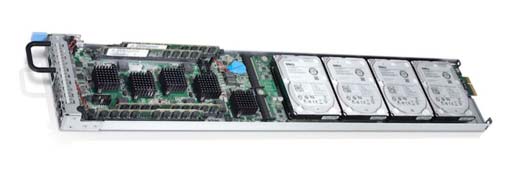Dell today announced its intention to cultivate the ARM-based server ecosystem though support of open development environments and delivering Dell “Copper” servers based upon ARM chips. The company said that the Dell Copper servers have been in development since 2010 and have been made available to select hyperscale and seed clients. The Copper servers were developed due to customer demand for density and power efficiency.

Currently there are no tier-one ARM-based servers as the market is immature and there is a lot of testing and development to do. Dell sees an opportunity to be a leader in ARM server technology by working in this new market developing both software and hardware solutions. Steve Cummings, at Dell Data Center Solutions has made a video explaining why they built the Copper servers, the scope of their usefulness and who may be interested in using them. Also Mr Cummings says Copper servers will be delivered to the “open source community” and also to ISPs to help people develop code for the ARM server platform.
The Copper server has 4 ARM processors per sled and 12 sleds giving a total of 48 server nodes in a compact C5000 chassis. At present Dell sees a role for ARM servers in web front-end and Hadoop environments where advantages in performance per dollar and performance per Watt are critical.
Dell Copper server overview video from Christina Tiner, from Dell Data Center Solutions
Leading industry partners include the companies Canonical and Cloudera. Mark Shuttleworth, founder of Canonical, said about Dell’s support for ARM server development “Ubuntu is the prevalent OS for scale-out workloads such as Hadoop, Condor, Memcached and edge-of-the-network web servers. The latest release, Ubuntu 12.04 LTS, is the first widely-certified enterprise platform with full support for ARM. That combination makes Ubuntu a great fit for the first generation of ARM servers.” Find out more here about Canonical's ARM-friendly version of Ubuntu Linux server OS.
Amr Awadallah, co-founder and CTO of Cloudera spoke of the energy savings of the Dell Copper SRM server “We are continuously seeking new technologies that can help our Big Data platforms operate at the next level of efficiency. We are very excited about the ARM based server line from Dell, as this technology will allow our customers to pack more processing heft into a smaller data centre footprint and do so with a significantly lower energy consumption profile.”
In the Dell Copper sever each ARM node uses about 15 to 16 Watts, a full 48 node system is quoted as drawing 750 Watts of power. An Intel Xeon server with as many nodes would consume about four times as much power. There are other companies working on servers based upon what may traditionally be called ‘mobile’ chips notably HP (ARM), Calxeda (ARM) and SeaMicro (who were using Intel Atom chips but were recently acquired by AMD). Dell says its ARM-based servers will also be a lot cheaper than traditional Intel versions when they become generally available.
Dell Copper ARM Server Specifications
|
Form factor |
3U chassis |
|
Architecture |
1S 1.6GHz, quadcore Marvell Armada XP system on a chip (SoC) |
|
Memory |
1 DIMM slot |
|
Drive bays |
1 x 2.5" SATA per node |
|
Hard disk drives |
2.5" SATA (7.2K rpm) |
|
Networking |
1GB Marvell Ethernet uplink per node (QSGMII) |






